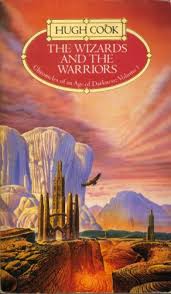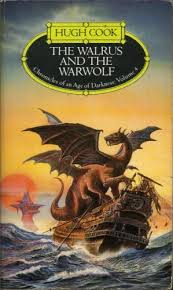Cook's Books
 Hugh Cook's Chronicles of an Age of Darkness are a weird and wild ride. A couple are well regarded, most are obscure, and I think the series took a general sales nose-dive in its second half. They were written between 1986 and 1992, so immediately after both the Belgariad and the first Shannara trilogy had just wrapped up, and mostly before the Wheel of Time had started (to locate the series against the big markers of epic/heroic fantasy of the time). And they're weird, and they're sometimes problematic, and they are enormously ahead of their time.
Hugh Cook's Chronicles of an Age of Darkness are a weird and wild ride. A couple are well regarded, most are obscure, and I think the series took a general sales nose-dive in its second half. They were written between 1986 and 1992, so immediately after both the Belgariad and the first Shannara trilogy had just wrapped up, and mostly before the Wheel of Time had started (to locate the series against the big markers of epic/heroic fantasy of the time). And they're weird, and they're sometimes problematic, and they are enormously ahead of their time.
There are ten of the books (1) (2), and they vary considerably in tone and style (3), though in general they share a plain intent to deconstruct fantasy tropes rather than simply retread them. Even the initial The Wizards and the Warriors, whilst it appears to be a traditional hero/quest story, dragons and all, has a lot of hidden depths and unconventional choices in it, and the books get steadily more bizarre from there. I want to just run you through the series with brief summaries, but the setting initially appears to be a fairly pulpy fantasy world in the Howard/Leiber/Moorcock (4) vein. However, it is dotted with the (horribly dangerous) ruins of what obviously was once a high-tech society (this was very popular in fantasies of the day — Brooks does it in Shannara, and there's Moorcock's Hawkmoon as well, and lots of the earlier pulps liked the idea of lost magi/tech civilisations). But this world isn't a future Earth, say, where civilisation has declined. Instead, we discover that it was a far-flung part of a galactic network which collapsed when (I think) its stargates went pff — or at least the gate local to this world did anyway, leaving it out of the loop. The magic of the world is a relic of ancient reality-warping disciplines that were a big part of that vanished galactic empire. But this sort of creeps in, mostly in the second set of five volumes. So, we have:
The Wizards and the Warriors — Morgan Hearst is a Rovac warrior, one of a band of wizard-hating Cimmerian-style killers, hired by a local despot whose court is visited by three travelling wizards. Hilarity ensues! Well, actually, kind of. Wizards shows us a world on the brink of magical apocalypse. Another wizard has stolen a magical WMD (and one that is enormously inventive in what it does, and why, by the world's metaphysics, it does it) and the trio are hunting him to retrieve it. Most of the book follows Hearst, the wizard Miphon and the ranger Blackwood as they try to retrieve the WMD and prevent the apocalypse, without, it must be said, a great deal of success. The world is very richly detailed, and Cook concerns himself with a lot of minutiae that bring it to life. Dragons aside, it's all interesting and different, but what is far more off the beaten track is Cook's tone and focus. Firstly, he tells jokes — the story is told with an irreverent twist that runs through the series and constantly undermines the dogged earnestness of many contemporary fantasists. Miphon is a fairly crappy wizard, for example, having power over animals, and his companions are both powerful fire wizards. Miphon has taken the precaution to wear waterproof clothes, though, so when we meet the three magicians, only he is bearing up under the rain. Hearst's own hero's journey has nothing to do with magic WMDs or dragons or any of that jazz, but is a deep exploration of the limits of the Rovac's "emo barbarian warrior-brotherhood" mental state. Hearst spends the book mourning for his lost bromance with fellow Rovac Elkor Alish, because he doesn't understand that Alish could want anything more than another mug of mead and another enemy to knife. He's a deeply flawed character, and sympathetic because of it. However, Wizards remains the most standard-fantasy of the series. After that, it goes south in short order (5). The biggest criticism of this volume is that it is absolutely a boy's own club. There are maybe two female characters, neither of whom have much to do. Hearst has far more emotional depth than most fantasy heroes of his time, but his is a world of men doing men things, wizards and warriors both.
Next we have The Wordsmiths and the Warguild, a much slimmer volume that is essentially a parody of the coming of age story. Our hero, Togura, is a fairly ineffectual young man who is sent on a ludicrously unlikely quest for something of no use, by people who have no idea what it does. There is some genuine heroic payoff towards the end but the book is mostly the hapless hero wandering from one crushing misfortune to another in a thoroughly unheroic manner. We do meet a few characters from the previous books, and this establishes the series-long practice of Cook's protagonists and supporting cast wandering in and out of each other's stories. Again, it's very much a boy's story (the hero's lost love is literally removed from the world at the start, denied even the chance to be in visible distress — but…)
The Women and the Warlords has a female lead — a woman who grows up in a patriarchal, sort-of-civilised society that just happens to be conquering the hell out of most of the rest of the world (they're bad guys in the previous books). She has an ambiguous position in her culture, and the book explores this very thoroughly. She goes through a great many escapades — meeting the Genghis Khan-style ruler, going on campaign, messing with politics, setting up in the wilderness, having a child. We see a great deal more about the world, especially from the perspective of someone who isn't a wizard or a warrior — and these are often the same events as Morgan Hearst rampaged through in the first book (indeed she meets Hearst and various other characters). Yen Olass, the lead, is a very complex, very well rounded character, and this book is Cook's character study of her — just as the first was his almost-straight swords and sorcery epic, and the second was his burlesqued bildungsroman. Cook can very obviously write a female character well, but the rest of the series is short of them. Cook's own account suggests he was under some pressure about Women, which was supposed to be book 2, and was felt 'uncommercial', and his later choices may well be a result of this.
 The Walrus and the Warwolf is probably the most highly regarded of the series after Warriors, and is about pirates. The two Ws of the title are both ships and their captains, and the whole story is a bold and gallant feud between the pair… except, as our hero — the rogue and liar Drake Douay — bats between the two, he discovers that both ships' attempts to out-pirate each other are based entirely on dressing up safe trading as derring-do — and yet their attempts to fake piratical deeds always go sufficiently wrong to lead to genuinely heroic escapades — which nobody then believes. The idea that people only believe lies is a major theme of the book, whether it's Drake's small lies, or the lunatic (and syphilis-inspired) religion that declares him to be the Antichrist. Walrus is enormous fun as a book, filled with interesting characters (albeit almost entirely men) and bizarre situations. This is the book in which we see a great deal of the world, often as the characters run very fast through it to avoid being killed. In its lightest moments there is almost an early Discworld‑y feel to Drake's misadventures. he and Rincewind could compare notes.
The Walrus and the Warwolf is probably the most highly regarded of the series after Warriors, and is about pirates. The two Ws of the title are both ships and their captains, and the whole story is a bold and gallant feud between the pair… except, as our hero — the rogue and liar Drake Douay — bats between the two, he discovers that both ships' attempts to out-pirate each other are based entirely on dressing up safe trading as derring-do — and yet their attempts to fake piratical deeds always go sufficiently wrong to lead to genuinely heroic escapades — which nobody then believes. The idea that people only believe lies is a major theme of the book, whether it's Drake's small lies, or the lunatic (and syphilis-inspired) religion that declares him to be the Antichrist. Walrus is enormous fun as a book, filled with interesting characters (albeit almost entirely men) and bizarre situations. This is the book in which we see a great deal of the world, often as the characters run very fast through it to avoid being killed. In its lightest moments there is almost an early Discworld‑y feel to Drake's misadventures. he and Rincewind could compare notes.
After that, The Wicked and the Witless falls somewhat flat — it follows a character we've met before, spoiled would-be warlord Watashi, in his personal and political shenanigans, neither of which he excels at — all of which then gets overtaken by the chaos of the magical/monstrous Armageddon from the first book, but for me it never quite gets going, and unlike Togura from book 2, Watashi doesn't have much about him to like. This book reads more "straight" than the rest, despite Cook's ongoing undermining of the heroic narrative.
That's the first five of Cook's series, and quite long enough for one post. There does seem to be a distinct divide between these and the next set — mostly I have the impression that, around this time, Cook realised that his grander plans for the series, whatever those might have been, were unlikely to come to fruition. Hence the SFnal element of the setting is foregrounded far more in several of the next books, and we learn a great deal more about why the world is as it is. And lots of other things are discovered to begin with W.
(1) Scuttlebutt suggests that Cook had a mad masterplan to write three 20-book series, 60 volumes in all. Not really sure I believe that.
(2) And of course there's nothing wrong with a 10 book series.
(3) I don't buy the suggestion that Cook was more than one person, but it has been advanced.
(4) Well sort of — Moorcock was very much doing his own twisting on the stock fantasy tropes, but you can look at Age of Darkness and see the same sort of pulp roots as Melnibone, for example.
(5) Not literally, because there are some holy-crap-nasty things in the south of Cook's world.
 © 2008-2024 Pan Macmillan
© 2008-2024 Pan Macmillan
Wow, that's a blast from the past! I read and enjoyed the first volume when it came out and fully intended to read the others but never got around to it. The book itself went in a purge many years ago.